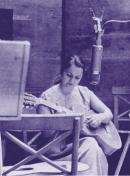- Violeta Parra: working guitar.
In the far 1917 a revolution that changed the destiny of humanity was born in Russia. That same year, the fourth day of October which was definitively historical in Chile, to the south of Our America, Violeta Parra was born; a giver of births mother of songs and tunes, oil paintings, tapestries and embroidery. She was a sweet neighbor of the green jungle.
There, near the Cape of Horn, we find the genesis of the New Latin American Song, singular movement of the artistic vanguard of our mongrel continent. In that primeval nest of renewal of popular song Violeta Parra was in Chile and Atahualpa Yupanqui in Argentina.
Both are the two pillars of a new type of song, who drinking from the oral traditions of their ancestors, brought content and new ways with an unprejudiced eye and, therefore, less elitist.
President Michel Bachelet, in her public letter last May addressed to the country, announced a project to celebrate the centenary of the author of «Gracias a la vida», a paradigmatic song in the vast range of Latin American song; an hymn of faith that we have sung over four generations of human beings all over the planet.
For me it is the perfect synthesis of Chilean identity. It is regret and garden volcanic rock and real people. It brought out the charango copper pain and quena hidden complaints; but Violet is also the seagull circling ports, the combination of the dove flapping against the troubles of poverty, at the same time she celebrates with the cueca the feast of fertile dances.
In her musical creation the human and the divine shake hands, the picaresque that literally shakes with macabre. I can not fail to mention, by the way, that she created music for texts of poets like Pablo Neruda, Gonzalo Rojas, and of course, her brother, Nicanor Parra.
What I could never understand is how the same woman who wrote «Gracias a la vida» («Thanks to Life»), the ecumenical poem, an hymn of faith that raises the most pessimistic, is the same woman who conceived «Maldigo del alto cielo» ("I curse from the high heaven") just the opposite, what becomes dark brown and ends in self-destruction. Violeta Parra is Chile as a whole: a nation of contrasts.






















































